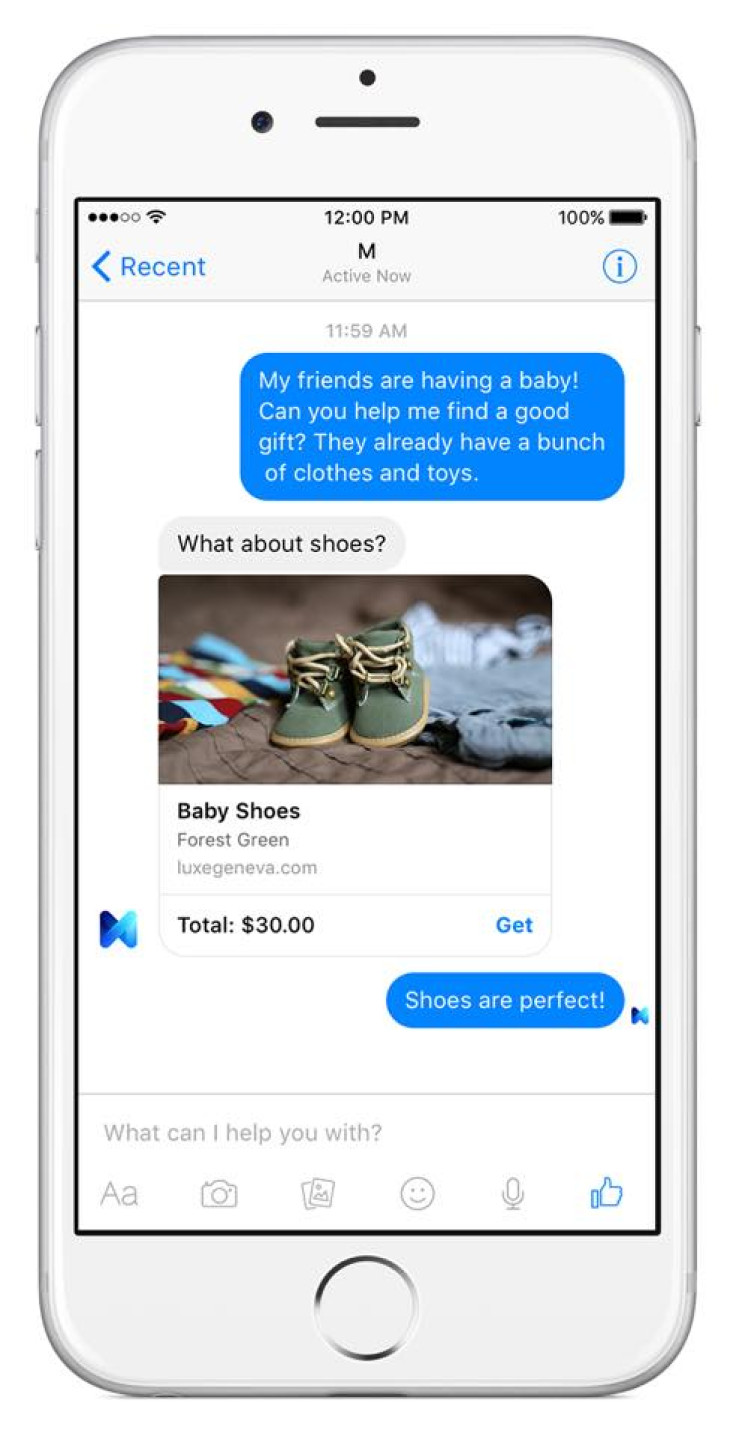Facebook's M assistant combines human and artificial intelligence to do 'anything you want'

It was in 2013, as Facebook's global users burst through the billion mark, that Mike Schroepfer embarked on a mission to transform the company into something more than just a social network. As Facebook's chief technology officer, Schroepfer set his sights on three ambitious goals: Developing drones to deliver global internet access, connecting the world through virtual reality and creating an AI assistant so powerful it can outperform a human.
Each one was recognised as a long-term goal, each with the potential to fail spectacularly, but two years on, Schroepfer and his team are beginning to shed light on the early stages of these projects. One of them is already being tested by users.
Through Facebook AI Research (FAIR), Schroepfer hired some of the brightest minds in artificial intelligence in order to conduct research into areas like image recognition and natural language understanding. What's come out of it is a new AI assistant called 'M'.
"Who cares whether it's human- operated or not behind the scenes, the question is 'what can this thing do for me?'"
What makes M different to other digital assistants, such as Apple's Siri or Microsoft's Cortana, is that the AI powering it is operated by humans, making it unrivaled in terms of its capabilities. Rather than simply tell users what the weather will be or give directions, M can complete complicated multi-step tasks. For example, M could not only purchase a gift for a friend online, it could also suggest what the gift should be and know which address it should be delivered to.
The major problem with using humans to supervise the AI, however, is that this model is nowhere near being scalable for Facebook's 1.5 billion users.
"It's impossible yet to predict how this is going to scale out," Schroepfer told IBTimes UK. "People are still figuring out how to use it, so we do not have a standard playbook for what the average user of M will do with M. Without that data, it's impossible to know what percentage will need to be automated in order to make it scalable."
Privacy and revenue
Beyond the technology itself, one of the major challenges for Facebook will be making users feel comfortable entrusting it with so much personal information. In the age of cyber-attacks and mass government surveillance, privacy advocates may argue that the risks outweigh whatever convenience M may add to someone's life.

"This is all totally optional, so if you don't want to tell us what you're toddler wants for breakfast, then we won't know and we don't need to know," Schroepfer said. "It's a question of utility, so if you want to ask a question about something, we may need to know the context to that question. Our aim on all of these things is only to have people providing the data that they need to accomplish the task, and I think that'll be OK."

Facebook's entire revenue system is currently structured around serving its users ads. Its quarterly earnings announced this week revealed that from the $4.5 billion (£3bn, €4.5bn) Facebook earned last quarter, $4.3bn (£2.8bn, €4bn) of that was advertising revenue. So could all this data gathered by M be used to deliver even more targeted ads?
"I don't think this stuff is hooked up to that stuff at all. At the moment this is all prototype work, we're generally very clear with people about how we use their data, so we'll make sure that's clear for everyone."
'Ask it anything legal and it will do it'
M is currently being tested by a small user-base in California, though actual numbers are yet to be disclosed. Also undisclosed is the time-frame in which the social network predicts it could be able to roll it out to all of its users. So far the short-term memory is close to being sussed, it's the long-term memory where the real challenge lies. It is this black spot that is being made up for by people.
When it is ready, Facebook is confident that it can pull people away from the established virtual assistants, like Cortana and Siri, simply through being vastly superior.
"Ask it anything that's legal − and you can afford − and it will do it on your behalf," Schroepfer said. "I use Siri to set alarms and basic tasks. I certainly don't ask it to suggest birthday gifts for my brother or book plane tickets or send parakeets or anything like that. Planes and cars will transport you to places but they do so in very different capabilities. I can't take a car from London to the US, I can take a plane. The proof is in the pudding when the user experiences it.
"Who cares whether it's human-operated or not behind the scenes, the question is: 'What can this thing do for me?', and if the answer is: 'Anything you want', people will be like: 'Really? Like what? Let me try'. It's still early, but the idea is not limiting what people can do with it."
© Copyright IBTimes 2024. All rights reserved.






